TURNING FOOD DESERTS INTO FOOD HARVESTS
- Details
- Category: Free and Low Cost Food Sources
- Published on Tuesday, 02 July 2019 20:19
- Written by D.V. LAWRENCE
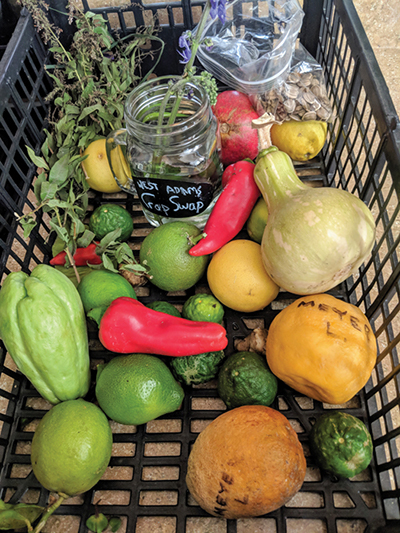 The Neighborhood News has often featured stories about local residents who were tackling the problem of limited or nonexistent healthy food options for people in our community. In South Central there are three million residents and 60 grocery stores, while on the Westside there are a hundred thousand residents and 57 grocery stores. Local liquor stores in struggling neighborhoods are tasked with acting as the stand-in food source where heavily salted or sweetened canned food, soft drinks, processed meats and white bread have become local diet staples along with fast food restaurants. But people have started to wake up and take action.
The Neighborhood News has often featured stories about local residents who were tackling the problem of limited or nonexistent healthy food options for people in our community. In South Central there are three million residents and 60 grocery stores, while on the Westside there are a hundred thousand residents and 57 grocery stores. Local liquor stores in struggling neighborhoods are tasked with acting as the stand-in food source where heavily salted or sweetened canned food, soft drinks, processed meats and white bread have become local diet staples along with fast food restaurants. But people have started to wake up and take action.We have written about people like Ron Finley, the Gangsta Gardner who turned dry grass parkways, that strip of land between the sidewalk and the curb, into community vegetable gardens. When TNN writer Deborah Charles interviewed him in 2011 this was considered illegal (thus the Gangsta Gardner label) but when Councilman Wesson at City Hall and the media stepped in, the wheels started turning and in 2015 City Hall passed an ordinance which allowed for the planting of community vegetable gardens on those parkways. (No fruit trees which require a permit). Yes, you and your neighbors can get together and plant a community vegetable garden in the parkways in your neighborhood, thanks to Ron Finley.
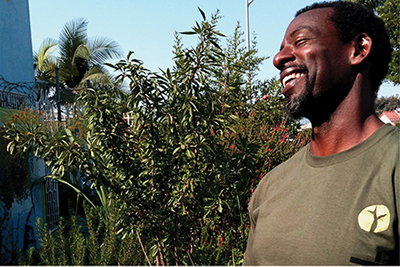
“Won’t anyone steal the vegetables?” is a common question. The food is usually bountiful and people are respectful but if someone is hungry, the parkway gardens are a neighborhood's way of helping.
www.ronfinley.com
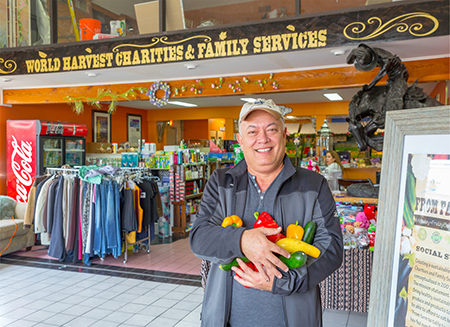 In our August 2017 issue, TNN writer Carla Pineda wrote about World Harvest Food Bank, whose creator and owner Glen Curado’s motto could easily be “As long as we are here, you will never go without.” With homelessness rising 23 percent in the past year, food insecurity is a growing challenge for Curado’s mission. In addition to receiving donated goods from Trader Joe’s and other grocery stores, Curado and his team say they procure organic produce and seek local growers as often as possible to offer quality fruits and vegetables. The premise is simple. If a family needs food assistance, they can pay $35 in cash or EBT for a cart full of groceries. If $35 is more than the family can afford, they have the option to volunteer 4 hours at the food bank to gain access to the facility’s inventory. Volunteer tasks include moving pallets, greeting people at the door, sorting through produce, or organizing products on shelves. The administration places volunteers, including disabled individuals, according to their physical capabilities and preferences.
In our August 2017 issue, TNN writer Carla Pineda wrote about World Harvest Food Bank, whose creator and owner Glen Curado’s motto could easily be “As long as we are here, you will never go without.” With homelessness rising 23 percent in the past year, food insecurity is a growing challenge for Curado’s mission. In addition to receiving donated goods from Trader Joe’s and other grocery stores, Curado and his team say they procure organic produce and seek local growers as often as possible to offer quality fruits and vegetables. The premise is simple. If a family needs food assistance, they can pay $35 in cash or EBT for a cart full of groceries. If $35 is more than the family can afford, they have the option to volunteer 4 hours at the food bank to gain access to the facility’s inventory. Volunteer tasks include moving pallets, greeting people at the door, sorting through produce, or organizing products on shelves. The administration places volunteers, including disabled individuals, according to their physical capabilities and preferences.Although the goal is to serve those who have a legitimate need, he doesn’t turn away anyone and doesn’t question anyone’s need. The food bank’s model weeds out people who want to take advantage of the system, he says. Anyone who lacks the $35 membership fee and refuses to volunteer his or her time, receives an emergency food bag until he or she can exchange time or a fee for access. People fearing the “four letter word — work” are unlikely to return, Curado says.
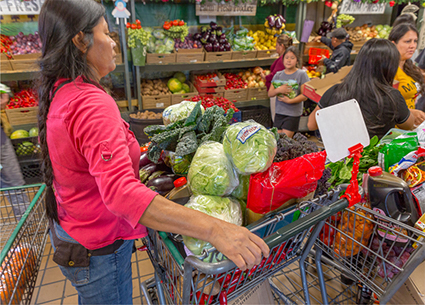 You don’t have to be low-income to shop at World Harvest. They welcome everyone. Although I don’t need a shopping cart, I often get my vegetable staples there. A huge bag of mushrooms, a nice fat round cauliflower, broccoli, carrots, celery for a third of what I’d pay at the local grocery store or Trader Joe's. I’m a fish eater (which they offer in the frozen food section) but primarily vegetarian, so I need a steady supply of fresh veggies.
You don’t have to be low-income to shop at World Harvest. They welcome everyone. Although I don’t need a shopping cart, I often get my vegetable staples there. A huge bag of mushrooms, a nice fat round cauliflower, broccoli, carrots, celery for a third of what I’d pay at the local grocery store or Trader Joe's. I’m a fish eater (which they offer in the frozen food section) but primarily vegetarian, so I need a steady supply of fresh veggies. www.worldharvestla.org 3100 Venice Blvd (Arlington)
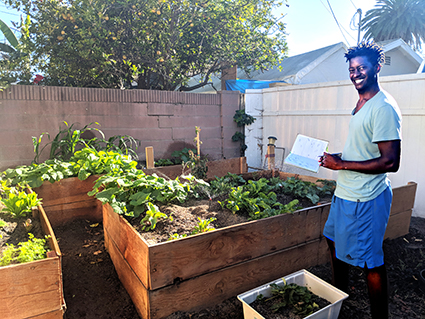 There is a new green trend gaining traction in neighborhoods everywhere. A simple google search will reveal community crop-sharing groups popping up around the country, especially in S. California where food can be grown all year long. One such group is the West Adams Crop Swap.
There is a new green trend gaining traction in neighborhoods everywhere. A simple google search will reveal community crop-sharing groups popping up around the country, especially in S. California where food can be grown all year long. One such group is the West Adams Crop Swap. When neighbors began sharing their love of gardening on the neighborhood connecting website, Nextdoor, they decided to meet and in October 2018, began holding monthly swaps at the home garden of one of the founding members Jamiah Hargins. Since then over 100 neighbors have shown up to these monthly swaps.
“Residents show up on the first Sunday of every month. They're a little groggy and are still kind of waking up but it's a nice community feel. It's had the same sensation of giving and openness and care and compassion that you would sense when you go to a church on a Sunday morning, except this is around gardening and food. People show up with all kinds of different things. Tamarindo, pumpkins, homemade things like Kombucha, even homemade bees wax cloth that you can use instead of cellophane. We've got people involved who are beekeepers, people who have chickens, eggs. People who've done all kinds of regenerative systems including aerated hydroponic systems." says Jamiah.
The core group is made up of Jamiah, Brendan Wilson, Liza Simone, Christophe Ambrosino, Tobias Tubbs and Jelani Thomas, each bringing a diverse set of skills and years of expertise in the world of urban farming and gardening with backyard bounty to prove it. They are gardeners on a mission, with a plan to grow community gardens in fallow land attached to local businesses, churches, schools, and on the lawns of agreeable residents who want in. (For a fee and under the watchful eye of landscape architect Brendan Wilson they will set up a garden on your property.)
They have already begun community service by harvesting the fruit from the trees of seniors and neighbors, getting the abundant, often ignored fruit left at the top of the tree to be shared at crop swaps, leaving the low-hanging fruit for the owner and enriching the soil around the tree for good measure.
Their ambitious expansion includes partnerships with other organizations like the FAME Renaissance building and Councilmember Harris Dawson’s team, where they are working on creating a farmers market at Adams and Western that will focus on crop sharing as well as other traditional market vendors. They will also be partnering with Best Start West Athens, whose mission is to strengthen community leadership and collaboration across sectors. They will be providing funding to Crop Swap to build two gardens.
Another goal is to provide work for recently released incarcerated citizens. One of the partners, Tobias Tubbs, had his sentence commuted by Governor Jerry Brown after serving a 30-year sentence. While in prison he started the Insight Garden Program, and now more than a dozen prisons have gardens that he helped create. He is designing a two-year reentry gardening program for Crop Swap, giving folks useful work skills that also help feed their families.
www.westadamscropswap.com
Categories
-
Senior Living
Senior Lifestyle Tips
 {jcomments off}Walking for Senior Health
Here's another senior health care tip. When walking for...
{jcomments off}Walking for Senior Health
Here's another senior health care tip. When walking for...
-
Animal Issues and Pets
Dog-Fighting, Cock-Fighting & Animal-Cruelty Hotlines
Los Angeles Animal Cruelty Task Force (213) 486-045024-hour notification hotline. Email: This...
-
Free and Low Cost Food Sources
HOMEGROWN WEST ADAMS CROP SWAP LA IS BLOOMING!
 {jcomments off}Last year TNN featured local residents who were responding to the healthy food...
{jcomments off}Last year TNN featured local residents who were responding to the healthy food...
-
Spiritual Community
THE ORIGINS OF WATCH NIGHT
 {jcomments off}Many of you who live or grew up in Black communities in the United States have...
{jcomments off}Many of you who live or grew up in Black communities in the United States have...
-
Student Beat and Scholarships
Global International Scholarships
GlobalScholarships.com is the world’s leading scholarship database for international students....
-
Local Sports
Queen Anne Park’s All Stars: Courage, Heart, Talent, Champs
 Queen Anne Park on West above Pico, has four baseball teams: the Dodgers, the Pirates, the...
Queen Anne Park on West above Pico, has four baseball teams: the Dodgers, the Pirates, the...
Today10
Yesterday10
Week37
Month237
All964851
Kubik-Rubik Joomla! Extensions
Yesterday10
Week37
Month237
All964851
Currently are 15 guests and no members online
Kubik-Rubik Joomla! Extensions



